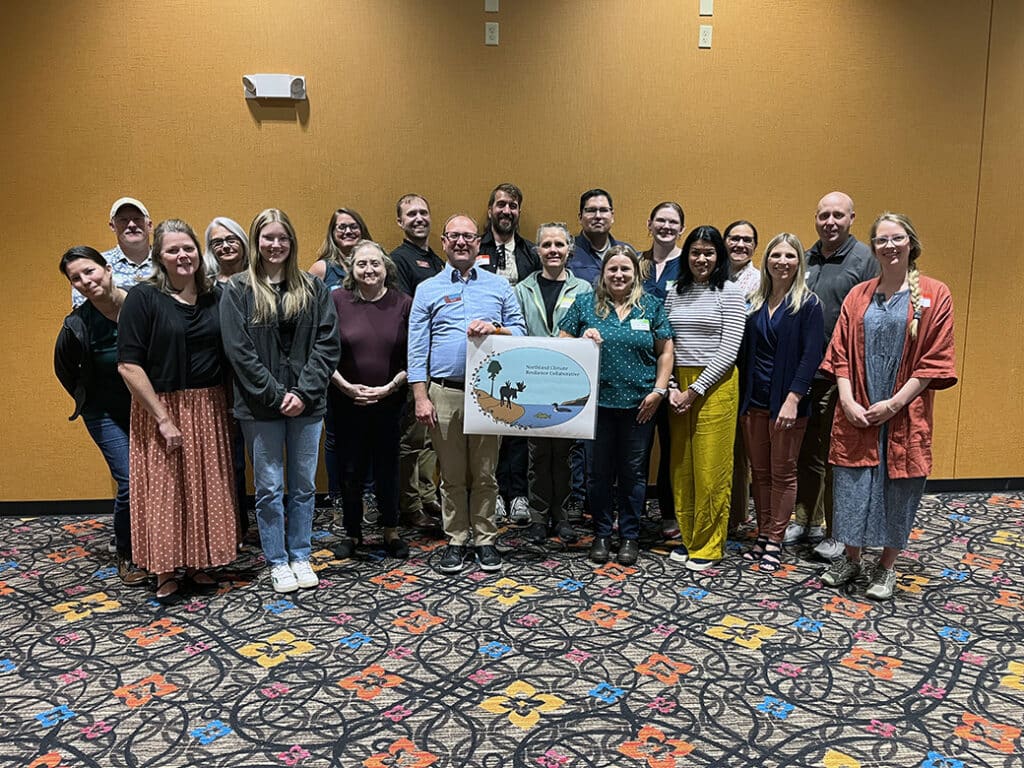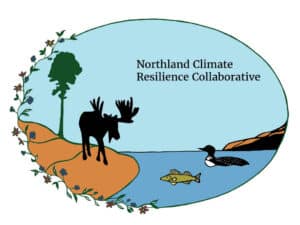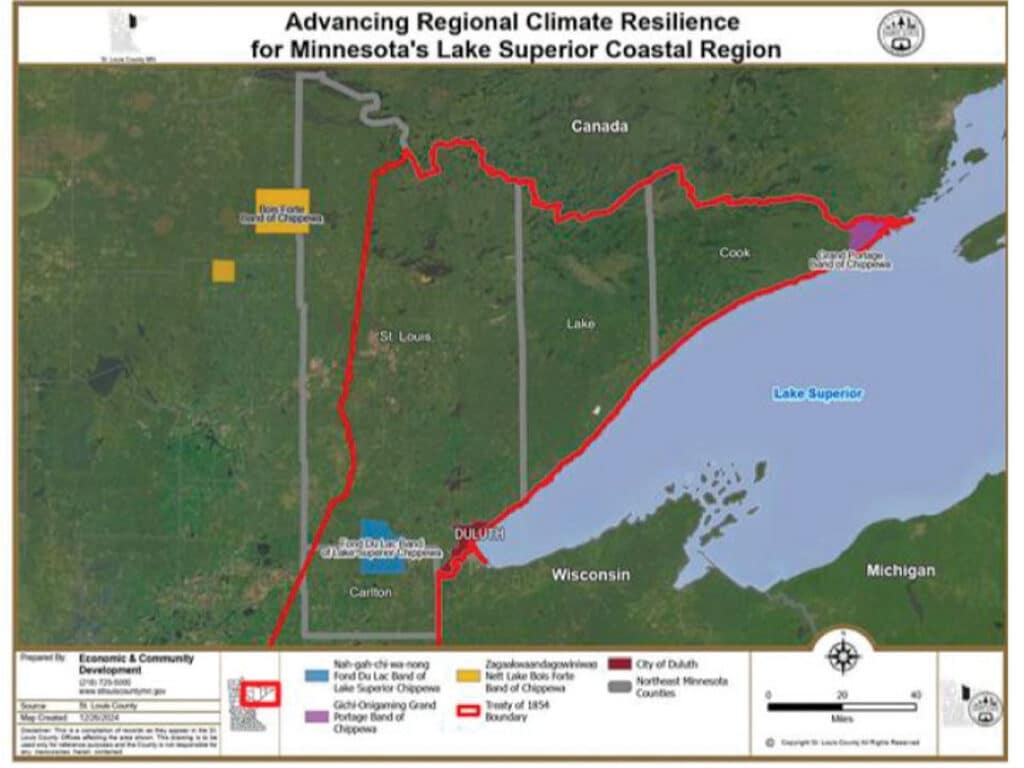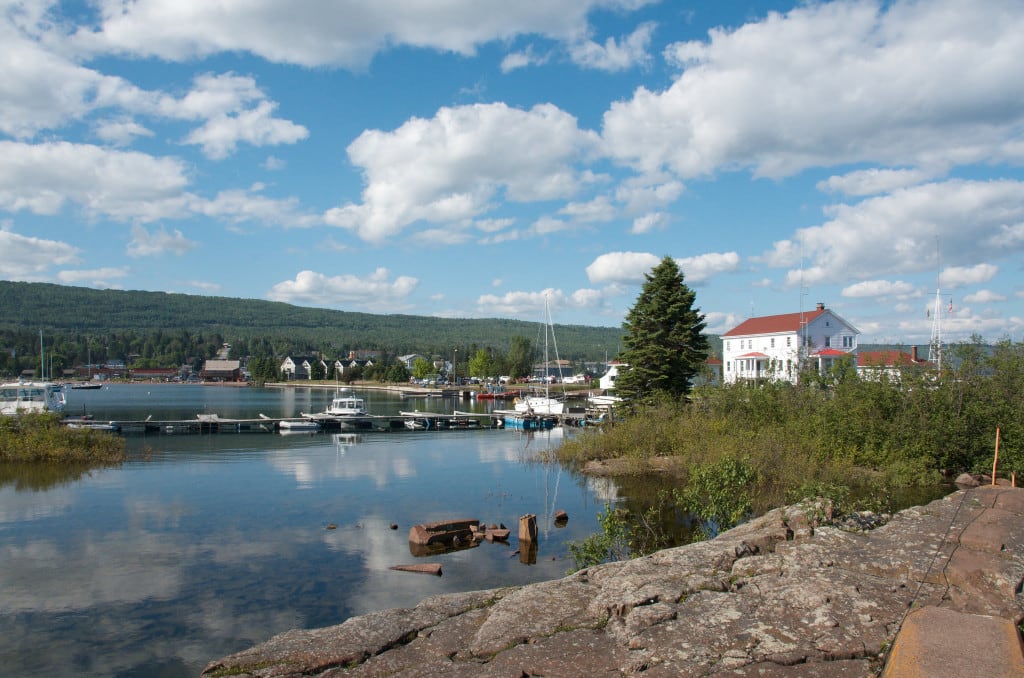
Local communities, Tribal Nations, state agencies, and multiple organizations have launched a partnership to develop a regional climate response plan in northern Minnesota. With a focus on climate issues, the newly formed Northland Climate Resilience Collective was funded through a grant from the National Oceanic and Atmospheric Administration (NOAA).
Climate resilient communities

State organizations, Tribal Nations, and multiple partners have joined forces to address changing weather patterns impacting coastal and inland communities along Minnesota’s North Shore. Although Minnesota has long pursued climate mitigation and management, a NOAA grant enabled these organizations to formalize relationships and strengthen their combined work.
The Northland Climate Resilience Collective (NCRC) now includes 17 partners across northeastern Minnesota. Together, they aim to build a coordinated response and work on shared priorities and projects. They’re fostering relationships and dialogue among Tribal Nations, state agencies, community governments, regional cities, and other key players.
The group is actively developing a Regional Resilience Plan to address issues such as weather preparedness, climate adaptation, and challenges. Additionally, they also seek to promote equity in authority and decision-making between Tribal Nations and municipal partners.
Unified front
They have multiple goals. Their approach fosters inclusive climate conversations that bring together the concerns of people, ecosystems, and the economy. While they don’t expect unanimous agreement, they believe meaningful progress will come through education, training, and workshops. In the long term, the Collective plans to build lasting climate resilience strategies that strengthen connections between local communities and Tribes.
Julie McDonnell of the Minnesota Department of Natural Resources (MNDNR) Lake Superior Coastal Program told WTIP that the goal extends far beyond simply surviving extreme weather or climate change. “Not only do we want to be able to withstand the potential impacts that are coming our way,” McDonnell said, “we want to be able to not only withstand it and bounce back, but we want to be able to thrive even with the changes happening.” The MNDNR recently acquired rare wetlands along Lake Superior to protect, preserve, and study these fragile ecosystems.
Team members have already begun conversations about coastal erosion, stormwater infrastructure, and strategies to make communities more climate-resilient.

Interview with climate planners
We spoke with Deanna Geelhoed, a climate resilience planner with Arrowhead Regional Development Commission, and Seth Spencer, a co-collaborator and extension educator of climate adaptation with the University of Minnesota’s Climate Adaptation Partnership. Both actively support the collaborative’s work.
Wilderness News: What inspired the formation of the Northland Climate Resilience Collective?
Deanna: Sometimes it’s hard for people across political boundaries, counties, cities, tribes, or different planning jurisdictions to come together. This grant gives people the capacity and time to come together and to be able to share successes and what works, and regional planning ideas.
WN: What does “climate resilience” mean in the context of northeast Minnesota?
Seth: So we know that that kind of term, climate resilience, can be kind of confusing. [It’s] making sure that all communities from very, very tiny rural areas of the region, all the way to the city of Duluth, have the knowledge, capacity, and resources to not only prepare but also bounce back from extreme weather impacts such as things like the blowdown most recently in Bemidji or things like the forest fires in St. Louis County.
WN: How have tribal governments’ sustainability practices influenced the project?
Deanna: The regional tribes we are working with are really strong at thinking long-term. And so we’re grateful we’ve been able to do some site visits to learn about their energy programs. We have two fellows hired through NOAA working on this project, and one of them is working closely with the tribes and their energy projects. This is a really big region, all the way from Carlton up to Grand Portage. So we’re working hard to kind of make these leadership meetings accessible. So next we’ll be meeting up in Grand Portage, and they’re taking the lead on sharing the work they’ve been doing. And we’ll strategize together about how we want to go about this planning process of developing this plan.
WN: Who is the resilience plan for, and where can people find it?
Seth: The regional resilience or climate resilience plan is going to be a public document. People always ask, Well, who’s it for? Well, it is for the counties and the tribal nations, but we hope that it is relevant to any organization within the region looking at climate adaptation and climate resilience. Another source is an online hub. We know there are plenty of online resources out there, but we’re focused on making sure all the documents we’ve discussed are publicly available, even beyond the scope of those four years.
WN: What happens when the grant ends?
Deanna: This is a planning grant through NOAA. There’s no money for construction. It’s just regional planning and resilience planning. Hopefully, we will have some kind of shovel-ready ideas to move on and ways that we can influence policy, and ways that we can band together to get more funding for this work. Even now, this state is developing its climate action framework, and they’re asking for feedback. So I’m hoping that we, as a collaborative, can give feedback on that to make sure the voices in the northeast are represented.
Part of nationwide initative
This collaboration forms part of a broader NOAA initiative that funds 18 regional coastal resilience projects nationwide. As the Northland group formalizes its plan, members have begun meeting with leaders of those projects to share insights and ideas.
Those interested in learning more can participate in two upcoming events. A webinar on “Coastal Inundation Community of Practice” will be held on Tuesday, June 24, 1:00-2:15 pm. Then, the Midwest Climate Resilience Conference is being held in Milwaukee, WI, in October. Additional information and a newsletter can be found on their website.
NOAA awarded the group a $1.85 million grant to fund their work through September 2028. Still, the Collective is actively pursuing long-term funding to ensure the project’s continued impact beyond that date.


